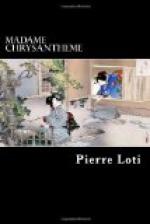There is even a little Shintoist altar, before which Madame Prune has not been able to restrain her feelings, and before which she has fallen down and chanted her prayers in her bleating old nanny-goat voice:
“Wash me clean from all my impurity, oh Ama-Terace-Omi-Kami, as one washes away uncleanness in the river of Kamo.”
Alas for poor Ama-Terace-Omi-Kami to have to wash away the impurities of Madame Prune! What a tedious and ungrateful task!!
Chrysantheme, who is a Buddhist, prays sometimes in the evening before lying down; although overcome with sleep, she prays clapping her hands before the largest of our gilded idols. But she smiles with a childish disrespect for her Buddha, directly her prayer is ended. I know that she has also a certain veneration for her Ottokes (the Spirits of her ancestors), whose rather sumptuous altar is set up at her mother’s, Madame Renoncule’s. She asks for their blessings, for fortune and wisdom.
Who can make out her ideas about the gods, or about death? Does she possess a soul? Does she think she has one? Her religion is an obscure chaos of theogonies as old as the world, treasured up out of respect for ancient customs; and of more recent ideas about the blessed final annihilation, imported from India at the epoch of our middle ages by saintly Chinese missionaries. The bonzes themselves are puzzled; what a muddle, therefore, must not all this become, when jumbled together in the childish brain of a sleepy mousme?
Two very insignificant episodes have somewhat attached me to her—(bonds of this kind seldom fail to draw closer in the end). The first occasion was as follows:—
Madame Prune one day brought forth a relic of her gay youth, a tortoiseshell comb of rare transparency, one of those combs that it is good style to place on the summit of the head, lightly poised, scarcely stuck at all in the air, with all the teeth showing. Taking it out of a pretty little lacquered box, she held it up in the air and blinked her eyes, looking through it at the sky—a bright summer sky—as one does to examine the quality of a precious stone.
“Here is,” she said, “an object of great value that you should offer to your little wife.”
My mousme, very much taken by it, admired the clearness of the comb and its graceful shape.
The lacquered box, however, pleased me most. On the cover was a wonderful painting in gold on gold, representing a field of rice, seen very close, on a windy day: a tangle of ears and grass beaten down and twisted by a terrible squall; here and there, between the distorted stalks, the muddy earth of the rice-swamp was visible; there were even little pools of water, produced by bits of the transparent lacquer on which tiny particles of gold seemed to float about like chaff in a thick liquid; two or three insects, which required a microscope to be well seen, were clinging in a terrified manner to the rushes, and the whole picture was no larger than a woman’s hand.




